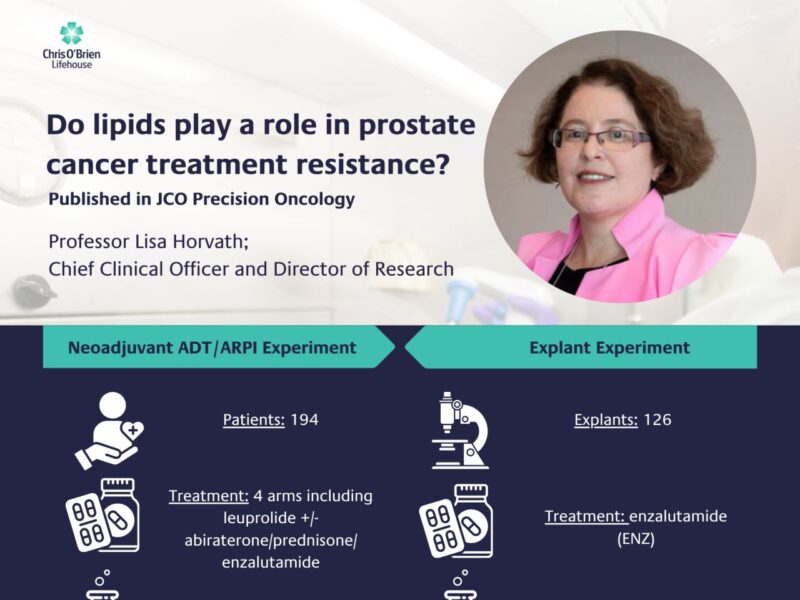Chris O’Brien Lifehouse shared on LinkedIn:
“Do lipids play a role in prostate cancer treatment resistance?
This is a question Chirs O’Brien Lifehouse’s Chief Clinical Officer and Director of Research, Professor Lisa Horvath, has been exploring with a team of collaborators, including partners from COBL, Garvan Institute of Medical Research, Baker Heart and Diabetes Institute and the Dana-Farber Cancer Institute.
A recent publication in JCO Precision Oncology has reported some of the results from their program, which ultimately aims to improve outcomes for people affected by prostate cancer.
The paper reported in the prestigious journal JCO Precision Oncology, shared results from two experiments involving blood samples from patients undergoing prostate cancer surgery. They analysed blood samples taken before and during systemic treatment (specifically androgen-deprivation therapy and/or androgen receptor pathway inhibitors) to identify lipid profiles. Additionally, they treated cancer tissues from these patients with a drug called enzalutamide in the lab.
The researchers found that certain lipids, like sphingomyelin and glycosylceramides, were linked to resistance, while lower levels of triacylglycerols were found in those who responded better. This is an important discovery, as it may allow lipid profiles to be used as biomarkers to predict treatment responses and tailor therapies more effectively.
From the second experiment, the team observed the response of prostate tumour samples ‘treated’ with enzalutamide in the lab., and observed their response based on lipid profiles. Similar to the plasma findings, higher levels of specific lipids were associated with resistance – another important finding that reinforces the opportunity to further explore new treatment strategies.
For instance, targeting lipid metabolism pathways might enhance the effectiveness of existing therapies. Moreover, using lipid profiles to guide treatment decisions could prevent unnecessary treatments for those unlikely to respond, reducing side effects and improving quality of life for patients (I would remove this sentence). A big congratulations to the team on this publication.
Follow the link to access the full publication.”

Authors: Hui-Ming Lin et al.

Tracey O’Brien shared this post, adding:
“Congrats to Lisa and all the teams involved. Love the visual abstract!”
Source: Chris O’Brien Lifehouse/LinkedIn and Tracey O’Brien/LinkedIn
Dr. Tracey O’Brien is the NSW Chief Cancer Officer and CEO of the Cancer Institute NSW, Australia. Before her current role, Tracey was Director of the Kids Cancer Centre, Sydney Children’s Hospital, and Director of the Transplant & Cellular Therapy Program.
Tracey has held numerous high-profile national and international leadership positions, including Advisory Chair, Cancer Australia; V/Chair (Africa, Asia and Australasia) International Centre for Bone Marrow Transplant Research and V/President of the Australian and New Zealand Children’s Oncology Group. In recognition of her exceptional contributions, Tracey was profiled in 2023 as one of the world’s foremost women in paediatric cancer by the International Society of Paediatric Oncology.
In 2019 Tracey was named in the Australian Financial Review’s prestigious Top 10 Women of Influence, winning the Innovation category. In addition to her medical expertise, Tracey has a Master of Law (Health) and executive MBA and serves as a conjoint Professor in Clinical Medicine (UNSW) and Honorary Professor in Science and Engineering (Macquarie University).
Dr. O’Brien remains committed to mentoring the next generation of clinician leaders and maintains an active clinical practice in cancer survivorship at Sydney Children’s Hospital.


